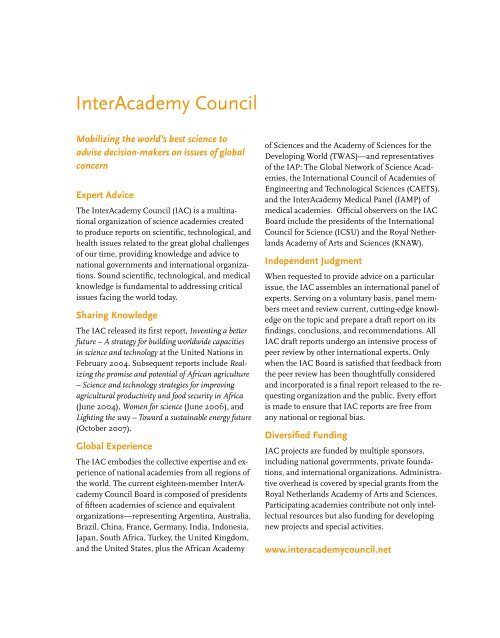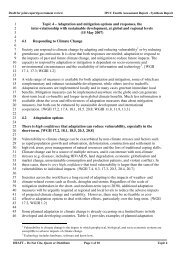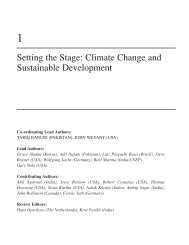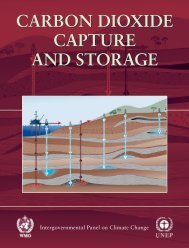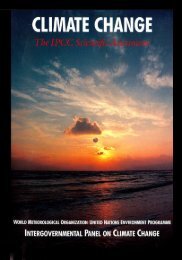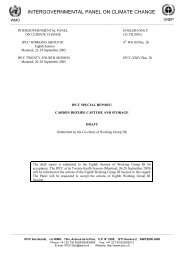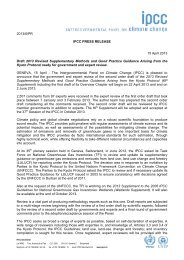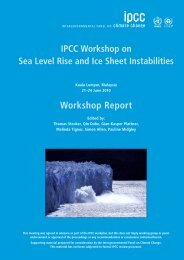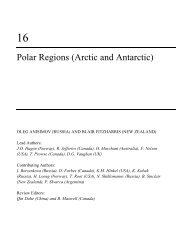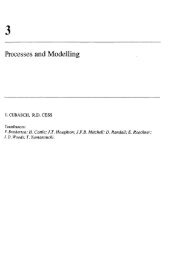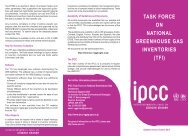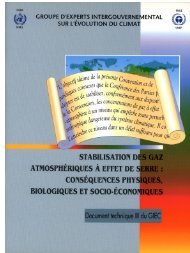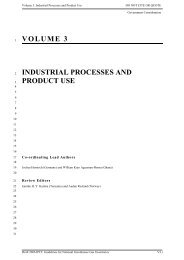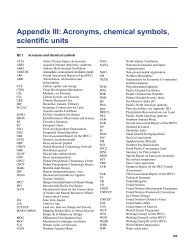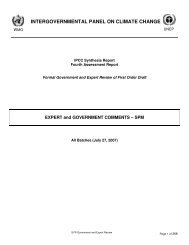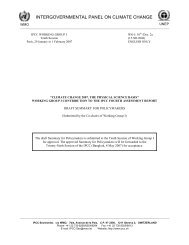Climate change assessments Review of the processes and ...
Climate change assessments Review of the processes and ...
Climate change assessments Review of the processes and ...
Create successful ePaper yourself
Turn your PDF publications into a flip-book with our unique Google optimized e-Paper software.
InterAcademy Council<br />
Mobilizing <strong>the</strong> world’s best science to<br />
advise decision-makers on issues <strong>of</strong> global<br />
concern<br />
Expert Advice<br />
The InterAcademy Council (IAC) is a multinational<br />
organization <strong>of</strong> science academies created<br />
to produce reports on scientific, technological, <strong>and</strong><br />
health issues related to <strong>the</strong> great global challenges<br />
<strong>of</strong> our time, providing knowledge <strong>and</strong> advice to<br />
national governments <strong>and</strong> international organizations.<br />
Sound scientific, technological, <strong>and</strong> medical<br />
knowledge is fundamental to addressing critical<br />
issues facing <strong>the</strong> world today.<br />
Sharing Knowledge<br />
The IAC released its first report, Inventing a better<br />
future – A strategy for building worldwide capacities<br />
in science <strong>and</strong> technology at <strong>the</strong> United Nations in<br />
February 2004. Subsequent reports include Realizing<br />
<strong>the</strong> promise <strong>and</strong> potential <strong>of</strong> African agriculture<br />
– Science <strong>and</strong> technology strategies for improving<br />
agricultural productivity <strong>and</strong> food security in Africa<br />
(June 2004), Women for science (June 2006), <strong>and</strong><br />
Lighting <strong>the</strong> way – Toward a sustainable energy future<br />
(October 2007).<br />
Global Experience<br />
The IAC embodies <strong>the</strong> collective expertise <strong>and</strong> experience<br />
<strong>of</strong> national academies from all regions <strong>of</strong><br />
<strong>the</strong> world. The current eighteen-member InterAcademy<br />
Council Board is composed <strong>of</strong> presidents<br />
<strong>of</strong> fifteen academies <strong>of</strong> science <strong>and</strong> equivalent<br />
organizations—representing Argentina, Australia,<br />
Brazil, China, France, Germany, India, Indonesia,<br />
Japan, South Africa, Turkey, <strong>the</strong> United Kingdom,<br />
<strong>and</strong> <strong>the</strong> United States, plus <strong>the</strong> African Academy<br />
<strong>of</strong> Sciences <strong>and</strong> <strong>the</strong> Academy <strong>of</strong> Sciences for <strong>the</strong><br />
Developing World (TWAS)—<strong>and</strong> representatives<br />
<strong>of</strong> <strong>the</strong> IAP: The Global Network <strong>of</strong> Science Academies,<br />
<strong>the</strong> International Council <strong>of</strong> Academies <strong>of</strong><br />
Engineering <strong>and</strong> Technological Sciences (CAETS),<br />
<strong>and</strong> <strong>the</strong> InterAcademy Medical Panel (IAMP) <strong>of</strong><br />
medical academies. Official observers on <strong>the</strong> IAC<br />
Board include <strong>the</strong> presidents <strong>of</strong> <strong>the</strong> International<br />
Council for Science (ICSU) <strong>and</strong> <strong>the</strong> Royal Ne<strong>the</strong>rl<strong>and</strong>s<br />
Academy <strong>of</strong> Arts <strong>and</strong> Sciences (KNAW).<br />
Independent Judgment<br />
When requested to provide advice on a particular<br />
issue, <strong>the</strong> IAC assembles an international panel <strong>of</strong><br />
experts. Serving on a voluntary basis, panel members<br />
meet <strong>and</strong> review current, cutting-edge knowledge<br />
on <strong>the</strong> topic <strong>and</strong> prepare a draft report on its<br />
findings, conclusions, <strong>and</strong> recommendations. All<br />
IAC draft reports undergo an intensive process <strong>of</strong><br />
peer review by o<strong>the</strong>r international experts. Only<br />
when <strong>the</strong> IAC Board is satisfied that feedback from<br />
<strong>the</strong> peer review has been thoughtfully considered<br />
<strong>and</strong> incorporated is a final report released to <strong>the</strong> requesting<br />
organization <strong>and</strong> <strong>the</strong> public. Every effort<br />
is made to ensure that IAC reports are free from<br />
any national or regional bias.<br />
Diversified Funding<br />
IAC projects are funded by multiple sponsors,<br />
including national governments, private foundations,<br />
<strong>and</strong> international organizations. Administrative<br />
overhead is covered by special grants from <strong>the</strong><br />
Royal Ne<strong>the</strong>rl<strong>and</strong>s Academy <strong>of</strong> Arts <strong>and</strong> Sciences.<br />
Participating academies contribute not only intellectual<br />
resources but also funding for developing<br />
new projects <strong>and</strong> special activities.<br />
www.interacademycouncil.net


